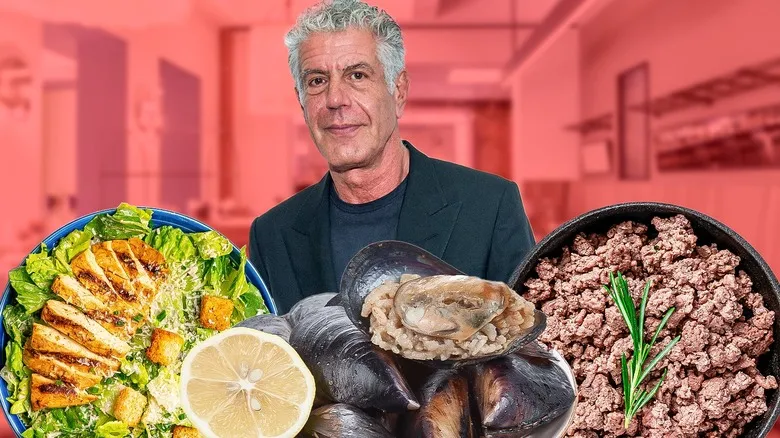Remembering Anthony Bourdain: Insights into Restaurant Ordering and Culinary Philosophy
Anthony Bourdain was more than just a chef and television host; he was a cultural icon who transformed the way we view food, travel, and the stories that intertwine them. His candid approach to life and food resonated with millions, and his practical advice on dining has remained influential. Bourdain’s culinary philosophy included a keen understanding of both what to seek out at a restaurant and what to avoid. In this article, we delve into some of his insights, particularly those related to what not to order at restaurants, the evolution of his renowned ‘Monday fish rule’, and the surprising types of food he shunned throughout his life.
14 Things to Avoid Ordering at a Restaurant
Bourdain was vocal about his preferences and pointed out several items that diners might want to steer clear of. Though there’s no definitive list that he constructed, several themes emerged in his critiques over his career. Here is a conceptualization based on his sentiments:
- Grilled Chicken Salad: A boring, safe choice that often signifies a lack of imagination on the part of the diner.
- Chain Restaurant Foods: These often lack authenticity and can be incredibly uninspired. Bourdain championed local, artisanal cuisines that tell a story.
- Anything with ‘Pasta Primavera’: Bourdain suggested this is a dated dish typically found at uninspired Italian restaurants.
- Vegetarian Dishes at Steakhouses: If you’re at a steakhouse, indulge in the meat; otherwise, you risk missing out on something great.
- Sushi in Non-Coastal States: The farther you are from the ocean, the less fresh the fish. Choose carefully.
- Anything Fried in a Restaurant: Bourdain suggested that many restaurants don’t maintain high standards for their frying oil.
- Dishes with Too Many Ingredients: Simplicity often leads to better flavors, and complex dishes may suffer from trying too hard.
- The ‘Chefs Special’: Sometimes this is a way to move less popular ingredients rather than highlight the chef’s true talent.
- Items That Have Been on the Menu for Too Long: If it’s been there forever, it may be time to rethink why!
- Salads with Excessive Dressings: This can mask the flavor of quality ingredients, and Bourdain often advocated for restraint.
- Food with a Backstory That Looks Too Good to Be True: Bourdain valued authenticity, so be skeptical of any dish that seems overly embellished.
- Buffets: A warning against the risk of unhygienic practices and food sitting too long.
- Dishes Named After People: More often than not, they are just a marketing gimmick.
- Flavorless White Bread: When dining out, opt for something more substantial or culturally relevant if offered.
Why Anthony Bourdain Changed His Mind on His Initial Monday Fish Rule
In the culinary world, Bourdain was known for declaring Monday as a bad day to eat fish, as the expectation is that many establishments would receive fish shipments on Monday, leading to the unsold fish from over the weekend still lurking around. The essence of his rule was rooted in freshness and quality of ingredients. However, as his career progressed, he acknowledged that this blanket statement might not hold true across all establishments.
Bourdain came to realize that with the rise of culinary innovation, new storage technologies, and responsible sourcing, some restaurants could maintain excellent fish quality, regardless of the day of the week. He ultimately refined his viewpoint, advising diners to look for signs of freshness rather than adhering strictly to the concept of the ‘Monday fish rule’. This evolution in thinking reflects Bourdain’s broader philosophy of being open to learning and adapting over time.
The One Type of Food Anthony Bourdain Never Ate
Throughout his journeys and culinary explorations, Bourdain encountered a plethora of cuisines. However, he was adamant in his aversion to one type of food: bland, frozen, processed, and mass-produced meals. Bourdain was an unwavering advocate of authenticity, and he often expressed disdain for food that lacked heart and soul. In particular, he never succumbed to the allure of fast food chains that offered little in terms of quality and experience.
In many interviews, he illustrated his reservations about anything that could be associated with corporate dining or that didn’t reflect regional characteristics. His disdain for what he termed ‘food industrial complex’ echoed in many of his reflects, urging consumers to be conscious of what they eat and the stories behind the meals they consume. For Bourdain, it was not just about eating; it was about the culture, the people, and the experiences surrounding food.
The Legacy of Bourdain’s Philosophy
Anthony Bourdain’s journey went beyond cooking; he sought to connect with people through their culinary traditions. Each meal was a door into another world, and he entered with curiosity and respect for others’ ways of life. His take on dining, with its roots in authenticity and exploration, remains a guiding principle for many food enthusiasts today.
His insights about what to avoid ordering at restaurants can serve as wise counsel for prospective diners who want to ensure their meals are as enjoyable as possible. Bourdain’s evolved perspective on seafood consumption showcases his adaptability and openness, both in culinary decisions and life.
Finally, his rejection of mass-produced food resonated deeply, particularly in an age increasingly dominated by fast food culture. Bourdain’s legacy serves as a reminder that food choices reflect our values, our quest for authenticity, and our connections to the world around us.
The food landscape has lost a passionate advocate with Bourdain’s passing, but his teachings remain alive, encouraging us to be mindful of our choices, appreciative of culinary artistry, and always eager to dive deeper into the stories our plates can tell.







